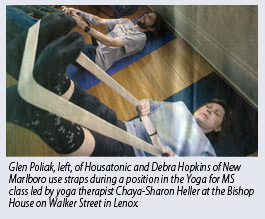 |
|||||||||||||||
 |
|||||||||||||||
 |
|||||||||||||||
 |
|||||||||||||||
Special Program
Chaya~Sharon Heller Holistic
Lifestyle and Adaptive Yoga September 18-22, 2005 at Kripalu Lenox, Massachusetts • 800.741.7353 • kripalu.org
Click here to download complete program information. (PDF 696KB) |
Easing MS through
Yoga
The Berkshire Eagle • Sunday, February 29, 2004
By Charles Bonenti
 Multiple
sclerosis is a chronic disease of the central nervous system that afflicts
about 400,000 Americans – mostly women.
Multiple
sclerosis is a chronic disease of the central nervous system that afflicts
about 400,000 Americans – mostly women.
Usually appearing in adults between the ages of 20 and 50, it causes scarring (or sclerosis) in the fatty tissue, called the myelin, that surrounds the nerve fibers. Sometimes the fibers themselves are broken or damaged.
This scarring can interfere with the impulses between the brain and the body's muscles, causing a loss of muscular coordination, difficulty walking, fatigue, dizziness, vision problems and emotional problems, according to the National Multiple Sclerosis Society.
 MS
is not contagious and not considered fatal, the society says in its literature,
and most people who have it do not become severely disabled. But there
is not cure yet, although drugs can help slow its course and ease its
symptoms.
MS
is not contagious and not considered fatal, the society says in its literature,
and most people who have it do not become severely disabled. But there
is not cure yet, although drugs can help slow its course and ease its
symptoms.
Exercise is also important to slowing the progress of MS and among the health programs like tai chi and aquatics, sponsored by the MS society is one in yoga, the ancient Indian practice of stretch/relaxation positions combined with meditation.
When Chaya-Sharon Heller, a Great Barrington-based yoga therapist and teacher, whose own mother has MS, heard last year that the society wanted to sponsor an MS/yoga class in the Berkshires, she saw herself as the ideal candidate to lead it.
"Because my Mom has MS," Heller said, "as I studied [yoga], I would think of how things could be adapted to suit her specific needs and how she could benefit."
She contacted Kara Macaluso, the program manager at the society's Central and Western Massachusetts Chapter headquarters in Worcester, and before long, with the help of referrals from Dr. Laurie Knepper of Lenox, who has a number of patients with MS, was heading the MS Society-sponsored class for seven women at the Lenox Community Center.
The spring and fall classes ran for six weeks each, but when her students lobbied her to continue through the winter, Heller agreed to set up her own class to fill the gap.
"What yoga does," Heller explained, "is help the student focus mentally on specific body motions and positions so that the neural connections between the brain and the muscles are strengthened." She likened it to "reprogramming" the brain.
While some exercise positions help increase muscle tone and range of motion and others aid in relaxation, practiced breathing is also seen as a benefit.
In its own booklet, "Exercise as Part of Everyday Life," the MS Society said: "The rythmic, abdominal breathing done in yoga is also important for people with MS who may not be able to achieve deep breathing through vigorous exercise. Deep breathing aids circulation and helps maintain respiratory health, diminishing the possibility of lung infections such as pneumonia."
Heller said she's seen a difference in those she has worked with over the past year in terms of flexibility and reduced pain. "There was a lot of resistance at first," she said, "but they've just blossomed."
 "We
started in chairs, then worked against a wall and now we're down on mats
on the floor," she explained.
"We
started in chairs, then worked against a wall and now we're down on mats
on the floor," she explained.
There are many kinds of yoga, she went on, and as a teacher she adapts the exercises to specifically benefit those with MS. She also gives "a lot of permission," she said. No one is pushed to do what may be beyond their capabilities and she is "always checking in" to guard her charges against fatigue.
By helping them unite their physical, mental and spiritual selves, Heller said, she wants her students to see themselves apart from their disease – which can be difficult for some.
"They are themselves," she said, "They are not MS."
Copyright
©2005. Chaya~Sharon Heller. All Rights Reserved
ChayaYoga, Massage & Herb Tea • 413.329.2182 • chaya@chayayoga.com
